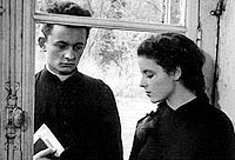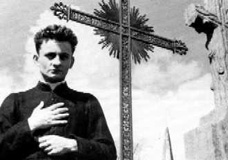Diary
of a Country Priest (Robert Bresson, 1951)
Warning:
Spoilers within, since I discuss the ending mostly... This is probably best read
after viewing the film, if at all...:
Apology: I cobbled this together from an old e-mail once
I recoiled in horror that I hadn't posted a review. Hopefully, it's still of
some use:
 French director Robert Bresson delivers a seemingly simple
account of one priestís spiritual challenges in his masterful, moving Diary of a
Country Priest. The story is delivered in a style that only seems simple on a
superficial level. For example, Bressonís generally placid camera zooms only
as characters realize something, or come closer to some sort of grace. All of
his cameraís movements and editing choices worked similarly, so the movie
develops a genuine language that exists to help to push the acting to the next
level of audience understanding. Other directors move their camera to accent
their actorsí performances, to be sure, but rarely is the methodology applied
so rigorously and successfully. When the priest faints near the end of the film
the movie fades to black, it is only a precursor to the filmís true ending,
which presents a death that is even more tangible to the audience: the end of
the film. For those watching the world that Bresson created, and for the priest
in the film, that final fade to black marks the death of the experience, the
death of the characters in the world (who all die vicariously through the
priest, even if they don't believe in him, since the volume of faith in the
world's reduced), and the death of the priest himself.
French director Robert Bresson delivers a seemingly simple
account of one priestís spiritual challenges in his masterful, moving Diary of a
Country Priest. The story is delivered in a style that only seems simple on a
superficial level. For example, Bressonís generally placid camera zooms only
as characters realize something, or come closer to some sort of grace. All of
his cameraís movements and editing choices worked similarly, so the movie
develops a genuine language that exists to help to push the acting to the next
level of audience understanding. Other directors move their camera to accent
their actorsí performances, to be sure, but rarely is the methodology applied
so rigorously and successfully. When the priest faints near the end of the film
the movie fades to black, it is only a precursor to the filmís true ending,
which presents a death that is even more tangible to the audience: the end of
the film. For those watching the world that Bresson created, and for the priest
in the film, that final fade to black marks the death of the experience, the
death of the characters in the world (who all die vicariously through the
priest, even if they don't believe in him, since the volume of faith in the
world's reduced), and the death of the priest himself.
 This sounds nihilistic when I read it over and think it
through, but Bresson only uses this negativity as a jumping off point by which we can
evaluate the earlier actions of the film. Because we can equate the end of film
with the end of filmís world, and the end of that with the end of the people
in the world, we must feel the loss of what weíve witnessed within ourselves.
Therefore, we must also understand that the priestís arrival at grace equals
his parishionersí arrival at grace and vicariously represents the audienceís
arrival at grace. These ideas are intrinsic to what the film is trying to say, I
think, and they did make me feel that all the miserable suffering that the
priest goes through really matters (I loved the reaction shots of the priest
near the end where you can't tell if he's grimacing because he's emotionally
disturbed by the state of the retired priest of if he's feeling physical pain),
since it presses him toward his revelation. People often throw the word
transcendent around talking about Bresson, but if you look what it is that is
being transcended here, itís actually quite radical. The physical pain of the
priest and the collective apathy that surround him are obviously overcome, but
the ending is structured so that it also blows away the small scale of this
story and the boundaries of cinema itself, telling us that the lives of its
characters exist only with our perception of them, if that makes sense. The last
shot of the cross signifies our collective arrival at grace. Since one man has
made it there, there's hope for us
all (and since ďall is graceĒ, we've already made it too, I suppose, if
weíre open to that possibility). The image of the cross on the movie screen is
overpowering because it explicitly shows us that ďall is graceĒ because
itís literally the only thing on the movie screen in the last shot. This
approach doesnít seem to preach at me so much as make me mourn a little when
the screen fades to black and the movie ends, because it takes that revelation
away from me (even as Iím free to carry it in my memory). I wonder a bit if
I'm reading too much into the movie's language, but it while I watched the film
it seemed absolutely apparent to me that this was why Bresson filmed things this
way. Whether that was indeed his intent, I have no clue. In retrospect, I
canít say that I really care either way.
This sounds nihilistic when I read it over and think it
through, but Bresson only uses this negativity as a jumping off point by which we can
evaluate the earlier actions of the film. Because we can equate the end of film
with the end of filmís world, and the end of that with the end of the people
in the world, we must feel the loss of what weíve witnessed within ourselves.
Therefore, we must also understand that the priestís arrival at grace equals
his parishionersí arrival at grace and vicariously represents the audienceís
arrival at grace. These ideas are intrinsic to what the film is trying to say, I
think, and they did make me feel that all the miserable suffering that the
priest goes through really matters (I loved the reaction shots of the priest
near the end where you can't tell if he's grimacing because he's emotionally
disturbed by the state of the retired priest of if he's feeling physical pain),
since it presses him toward his revelation. People often throw the word
transcendent around talking about Bresson, but if you look what it is that is
being transcended here, itís actually quite radical. The physical pain of the
priest and the collective apathy that surround him are obviously overcome, but
the ending is structured so that it also blows away the small scale of this
story and the boundaries of cinema itself, telling us that the lives of its
characters exist only with our perception of them, if that makes sense. The last
shot of the cross signifies our collective arrival at grace. Since one man has
made it there, there's hope for us
all (and since ďall is graceĒ, we've already made it too, I suppose, if
weíre open to that possibility). The image of the cross on the movie screen is
overpowering because it explicitly shows us that ďall is graceĒ because
itís literally the only thing on the movie screen in the last shot. This
approach doesnít seem to preach at me so much as make me mourn a little when
the screen fades to black and the movie ends, because it takes that revelation
away from me (even as Iím free to carry it in my memory). I wonder a bit if
I'm reading too much into the movie's language, but it while I watched the film
it seemed absolutely apparent to me that this was why Bresson filmed things this
way. Whether that was indeed his intent, I have no clue. In retrospect, I
canít say that I really care either way.
* * * * Masterpiece
01-05-02
Jeremy Heilman